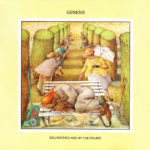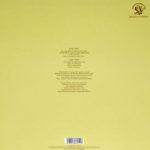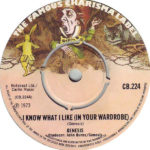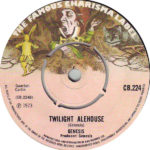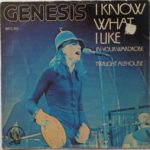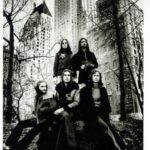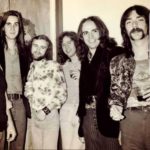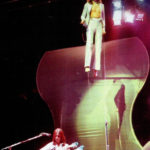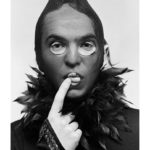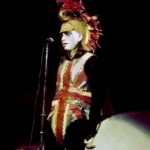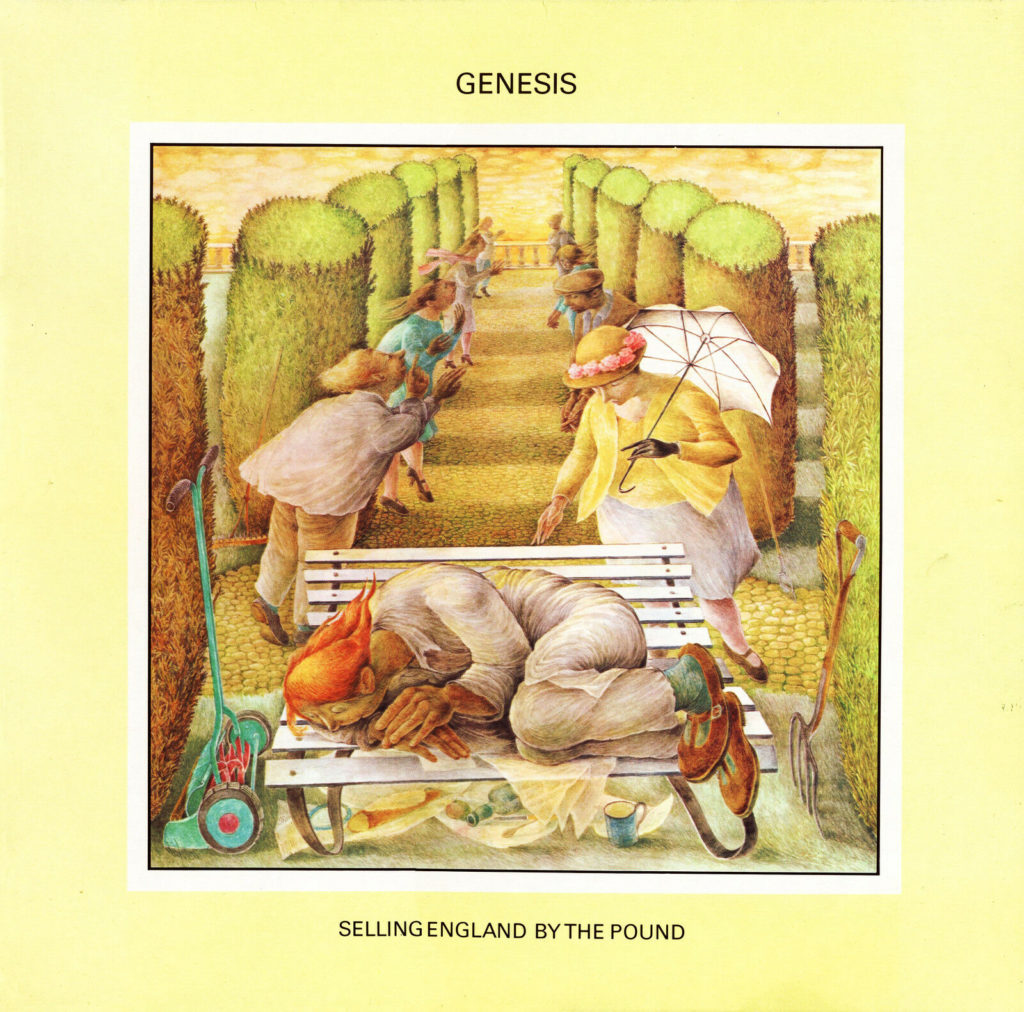Genesis – Selling England By The Pound
“Take a little trip back with father Tiresias”
I am definitely going to get some flack on this post. I mean we are talking about an album that is not only many fans’ favourite Genesis album but one that many consider to be their favourite Prog Rock album or favourite album ever. The reason I may get some flack is that it isn’t mine, but I’ll try to explain why later. Also, I thought this would be a shorter post…I guess I was wrong…It’s huge.
So, May 1973 and the band had finished the Foxtrot tour, and released their stopgap Live album. They were so busy touring that they didn’t have time to write much new songs other than some embryonic ideas. Their record label Charisma allowed them a couple months to write brand new material which they did as they moved around through several locations in England. The album was then recorded over 3 weeks in August at Basing Street Studios in London by John Burns who was also an engineer on the Foxtrot album. The members of the band have all stated it wasn’t a particularly difficult album to write despite having little material and Steve Hackett’s marriage was falling apart. What is hard to fathom from a current perspective is that the band wrote and recorded arguably their greatest album in the span of 4 months…and incredibly wrote and recorded and toured Trespass, Nursery Cryme and Foxtrot over the preceding 3 years.
What they ended up with was a very English sounding album…chalk full of British references and stories…almost with the intention of conveying their Englishness and perhaps as a reaction to touring the US for the first time. Ironically their next album would be set in New York City which is slightly different from England.
Dancing With The Moonlit Knight kicks off the album with the a-capella line “”Can you tell me where my country lies?” Said the unifaun to his true love’s eyes”. Now I have been listening to Selling England By The Pound for about 40 years and I still have no idea what this means. I also have no idea what a unifaun is – I think it is a made-up word, morphed to sound like uniform. That being said I actually thought the word was uniform until a couple years ago. The next few lines add gentle guitar and subtle keyboards which sound like something from a baroque garden party – ending with the album title. The beauty of these two verses is that it sets the tone for the entire album and it also establishes Gabriel’s voice in a very different way from previous albums. It is soft and gentle and much more controlled. Throughout this entire album he sounds extremely confident and comfortable and I’d venture to say this may be his strongest album vocally of all his Genesis albums. The song moves through a variety of sections over 8 minutes. Absolutely nothing is rushed. It all unfolds in gradually progressive movements with lyrics that underplay an almost random dialogue of English ideologies. I don’t really know what the song is about specifically from the lyrics, but I do know it feels like someone trying to sing what the weight of being English is like, but in fractured ideas. Regardless it works well, and the song has become another fan favourite over the years. This is the sound of the band firing on all cylinders. They are writing and playing as about as cohesively as a unit as one could imagine. Every line bursts and pulsates with ideas that weave in and out of songs. Changes to instrument sounds, instruments played, time signature changes – sometimes within individual stanzas, changes to tempos all make up the beauty of this album and it is all evident on the opening track alone. You can tell they were really listening to what each other are playing and contributing to the songs. It is also probably a testament to the production of the album as well.
The first song fades in and out gently like it is panning out of a fairy tale put to music and is replaced by a vibrating, pulsating musical sound that I believe is supposed to emulate a lawnmower. Steve Hackett had been playing a riff during sound checks on the Foxtrot tour and like much of his contribution to this album, presented ideas for consideration that would morph into key riffs and motifs in songs. I Know What I Like (In Your Wardrobe) would exponentially increase the profile and popularity of the band when it was released as a single, being the first time the band would crack the top 40 in the UK. It is a fun song and the least complicated one on the album. It also displays more of Peter’s interest in using characters and dialog as a lyrical and vocal technique. If anything, it suffers from a fairly repetitive chorus but at only 4 minutes long it does its job and moves on to set up the tour de force that is Firth Of Fifth.
Again, another English reference – a Firth being an estuary or narrow inlet of water on the coast. There is no Firth of Fifth but there are many others including the Firth of Forth in Scotland. The song starts with a 1 minute and 7 second classical solo piano opening by Tony Banks that is now iconic in nature before the band crashes in. The wonderful lyrics of the two verses that follow are somewhat abstract and serve to act more as a texture to frame the meat of the song. At this point you start to realize just how much of a piano driven album this is. It is everywhere and it is fantastic. Three minutes in and the music drops away to a piano/flute section that then evolves into one of the most sweepingly incredible pieces of music ever committed to vinyl. Piano, drums, mellotron, bass pedals, keyboards, fuzzy guitar kick in before the 5:40 mark when it again slows to half time and Steve Hackett lays down probably his most iconic guitar solo of his entire career. It is one of the most beautiful pieces of music I’ve ever heard. Notes swell and are sustained in places that evoke extreme emotional responses. It sings and swirls over the course of three glorious minutes before dropping out to resolve the song with a final verse, after which the song fades out to a similar ending reflective of the beginning. It is in some ways like a microcosm of the whole album which also resolves in a similar manner. Inexplicably the band would axe the piano intro when performed live following Gabriel’s departure. Shame on them for not knowing better.
For those who were surprised by Phil Collins’s move to lead vocals in 1976, More Fool Me which ends side 1 of the album is the second song in their catalog which he sang vocals on…so if you were surprised…you probably weren’t paying attention. Truth be told Phil’s voice is quite similar to Peter’s so the miss would be understood as well. The song is a gentle piece written by Phil and Mike Rutherford and in hindsight is almost a calling card to a future just a couple years off. Some people really don’t like this song which absolutely baffles me because it is a real beauty, sung gracefully and delicately. The multi tracked vocals by Collins are truly exquisite. If you don’t like More Fool Me I’m not sure we can be friends.
Ok remember when I’ve mentioned that there are times when Genesis has too much going on in a song? Well Side 2’s 11-minute epic known as The Battle Of Epping Forest is definitely the worst example of this. It should be called The Battle Of Music and Vocals. Gabriel had a lot he wanted to say and sing, and the band had a lot they wanted to play. Often the band would write music and then Peter would take it away and write lyrics overtop the music. The Battle Of Epping Forest is a sprawling tale of a gang rivalry related story Gabriel had read about but couldn’t recall the details, so he ended up writing his own story with a host of characters. He creates a tapestry of characters and sings the dialog in a wide variety of voices to emulate each one. It is very well done, and the lyrics are great but in the end it just doesn’t really sit well with the music. It feels like the band wrote an amazing song and then an equally amazing vocal/lyric was pasted on top and everything ends up suffering in a blaze of reverse synergy. They achieved the opposite of what songs like Springsteen’s Jungleland or Incident On 57th Street did. Is it too much of a good thing, or too much of too many good things? Dancing With The Moonlit Knight struggles a bit with this problem as well. Anyway, they say she comes on a pale horse…oops sorry too soon…Epping Forest is my least favourite song on the album. Don’t hate me – I’m allowed to have an opinion.
I also want to mention one thing here also about the remix/remaster series from 2007. I’m not a fan of them AT ALL. Despite clearing up some of the mixes – I have a real problem with the choices made to push some instruments and sounds out – I find it incredibly distracting – I guess I know the material so well that I find when people fuck around with it, it only diminishes from the experience for me. I mention it here because I find there are sections of this song that suffer if you are listening to the 2007 version (same with The Lamb and Foxtrot which miraculously manages to screw up the timing of the spoken phrase “Hasn’t It” after the line “Its been a long long time” at 1:50 into Supper’s Ready). The mid 90’s Definitive Edition Remasters are far better in my opinion.
After The Ordeal is an often overlooked instrumental. It is probably my most favourite underappreciated track of the Gabriel era. It is a beautifully played Nylon string piece with wonderful piano and an extended electric guitar solo with flute ending. It feels a bit like an alternate take on the solo section of Firth Of Fifth, but less epic and it doesn’t resolve quite as elegantly. I love the interplay between the piano and guitar and find it mind boggling that Banks and Gabriel didn’t want it included on the album as it really balances out Hackett’s contribution to the record and the band as a whole. I’ve read that he threatened to leave the band if it wasn’t included. Thankfully we would get three more amazing albums from him before that happened.
Last up is The Cinema Show/Aisle Of Plenty. As much as I love Firth Of Fifth, I have to say The Cinema Show is even more spectacular. It’s like they took The Musical Box and Firth Of Fifth and said let’s create the ultimate version of the best of what we can do. It is the equivalent of musical greatness on steroids. It is so subtle and textured there is no way you can’t love it – which is probably why it is also considered one of, if not the best song the band ever wrote. I also said that about Supper’s Ready but The Cinema Show is something else entirely. It is essentially two distinct pieces merged together and Like much of this album I’m not entirely sure what it is about – The first part is a gorgeous acoustic duet played by Banks and Rutherford – similar in feel to The Musical Box. Lyrically the first two verses reference Romeo and Juliet going on a date and has this very repressed English sexual inuendo feeling to it. The third verse references The Waste Land by T.S. Elliot and is accompanied by the whole band along with Hackett’s signature flourishes and effects. The first half of the song is a perfect mesh of lyrics and music – the antithesis of the inherent problems found in The Battle Of Epping Forest. The song again breaks down a bit to flute/oboe/guitar much like Firth Of Fifth does with piano and flute, with some gorgeous layered textured vocals from both Collins and Gabriel before the third verse repeats. The short instrumental that bridges them acts as a set up for what is to follow which is a quick guitar solo that leads into a 4 minute monster extravaganza in 7/8 time. What follows is arguably the greatest keyboard solo in prog rock history and is in many ways the equivalent of what Hackett did on the back half of Firth Of Fifth. Something I didn’t realize until recently is that the entire second half of The Cinema Show features only Collins, Rutherford and Banks – Hackett does not play on this entire section and it is partly why the band felt they would be OK as a trio when he departed in 1977. Following the solo section, the song breaks back down to just acoustic guitar and Aisle Of Plenty rounds out the album with a musical/vocal verse similar to the one that opened the album. It is nice subtle way to bookend the record as the price of various groceries are sang by Collins and Gabriel like something you might hear at a slow speed renaissance auction. You need to hear it to know what I mean. Funny both this album and Foxtrot end with a section in an odd time signature that then leads to a finale which refer to eggs – the final section of Supper’s Ready being titled “As Sure As Eggs Is Eggs” and the last line of Aisle Of Plenty being “It’s scrambled eggs”. I don’t know if that means anything…probably not but a nice anecdote. Actually Eggs are also referenced in the last song on the follow up album as well….maybe I’m on to something….Genesis…Eggs.
I do think that the absolute beauty of both Firth of Fifth and The Cinema Show alone are enough to qualify this album among the upper echelon of great records. I think it is also why many people consider this to be the bands best album. Personally, I hold these two songs among the greatest achievements they ever created. For me, though, I would actually rank Selling England as my second favourite Genesis album. The reason being the despite being an incredibly cohesive record and having such awesome peaks of excellence…a few things just aren’t quite there for me. I Know What I Like is good but not spectacular. The Battle Of Epping Forest buckles under the weight of its own overreaching ambition (much like this review). And to a lesser degree Dancing With The Moonlit Knight which as noted is really a more subtle issue. So at least 1/3 of the album for me ends up being enjoyable but not quite at the level of the other 2/3. That is a percentage I don’t have a problem with on the follow up album. The debate between many fans between Foxtrot, Selling England and The Lamb as their best record is one that is still discussed and vehemently defended but it does go to show just how incredible this hat trick of albums was. More on the Lamb in the next post.
Oh I would also be remiss if I failed to mention the song Twilight Alehouse which is song that was written around the time of Trespass, recorded during Foxtrot and released as the b-side of the I Know What I Like single. It sounds a bit like a couple songs off their first album “Am I Very Wrong” and “The Serpent”, with bits from “The Musical Box” and wouldn’t have been out of place on Nursery Cryme or Trespass. It has a lot of flute. Maybe the most flutey song they recorded. It is a longer song at almost 8 minutes and some people absolutely love it. I like it but I find it a bit repetitive and I think it is fine as a b-side in the lexicon of the band. It is nice that there is this other song out there that you need to be in the know to know…if you know what I mean…you know?
Two last little tidbits. There is actually another song the band worked on for the album called Déjà vu which Hackett and Gabriel developed but was unfinished. Hackett ended up finishing the song and recorded it on his 1996 Genesis Revisited album and it is worth checking out. Finally, a few pics are included here of the live shows that supported the album for historical context including the stocking for Epping Forest and the Soldier for Moonlit Knight.
Recommended Listening – Dancing With The Moonlit Knight, Firth Of Fifth, After The Ordeal, The Cinema Show
For hardcore fans here is a download of “Selling England By The Session” –
http://www.darrincappe.com/Genesis/SellingEnglandByTheSession.zip
